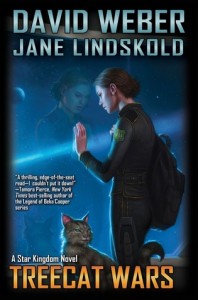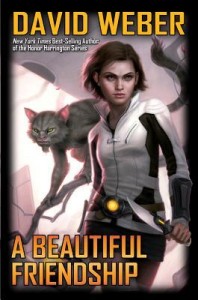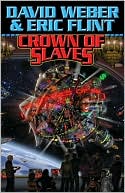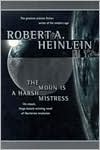 Format read: ebook provided by NetGalley
Format read: ebook provided by NetGalleyFormats available: ebook, hardcover
Genre: YA science fiction
Series: Honorverse: Stephanie Harrington, #3
Length: 288 pages
Publisher: Baen
Date Released: October 1, 2013
Purchasing Info: Author’s Website, Publisher’s Website, Goodreads, Amazon, Barnes & Noble, Book Depository
The fires are out, but the trouble’s just beginning for the treecats
On pioneer planet Sphinx, ruined lands and the approach of winter force the now Landless Clan to seek new territory. They have one big problem—there’s nowhere to go. Worse, their efforts to find a new home awaken the enmity of the closest treecat clan—a stronger group who’s not giving up a single branch without a fight
Stephanie Harrington, the treecats’ greatest advocate, is off to Manticore for extensive training—and up to her ears in challenges there. That leaves only Stephanie’s best friends, Jessica and Anders, to save the treecats from themselves. And now a group of xenoanthropologists is once again after the great secret of the treecats—that they are intelligent, empathic telepaths—and their agenda will lead to nothing less that treecat exploitation.
Finally, Jessica and Anders face problems of their own, including their growing attraction to one another. It is an attraction that seems a betrayal of Stephanie Harrington, the best friend either of them have ever had.
My Review:
Stephanie Harrington may be a bit too close to perfect, but the treecats finally reveal themselves as being all too human in this third book of the YA spinoff of David Weber’s Honor Harrington series.
 In A Beautiful Friendship, the first book in the series, Stephanie Harrington is the 11-year-old who not only outsmarts her parents and all the other adults on Sphinx, but also manages to out-clever the fully sentient native treecat species that has successfully evaded humans for a couple of centuries by the time that Stephanie comes along.
In A Beautiful Friendship, the first book in the series, Stephanie Harrington is the 11-year-old who not only outsmarts her parents and all the other adults on Sphinx, but also manages to out-clever the fully sentient native treecat species that has successfully evaded humans for a couple of centuries by the time that Stephanie comes along.
Fire Season continues the theme of the treecats and the teenagers both being a bit too good to be true, and anyone who underestimates one or the other getting their comeuppance by way of a planet that is still way more frontier than settled.
In Treecat Wars, while the theme of human political machinations being evil definitely gets played to the hilt, we see the full range of treecat intelligence. They are every bit as intelligent as we are. The problem with having a high level of intelligence is that they are also capable of low-cunning and of going insane, just like us.
The treecats in this series who are point-of-view characters, Climbs Quickly and Dirt Grubber, call themselves “The People”, and refer to individuals as “Persons”. Individual “Persons” can lose their way, and when they are Elders, they can lead a whole clan astray. After a fire season, when food is scarce, treecats compete for resources, just as humans do. In this unsettled time, one treecat murders another, and starts a misguided war.
Meanwhile, humans are attempting to control how the universe at large perceived the treecats. They are sentient. But are they as intelligent as humans? Should they be protected? If so, in what way? History shows that protected native species and tribes do not fare well. Are the treecats dangerous? They are economically dangerous to those who believed that Sphinx was uninhabited.
Some people will stop at nothing to eliminate any threat to their supposed superiority. If they can’t find a way to portray the treecats and their partners negatively, they may resort to something more permanent.
Escape Rating B+: I read through the entire series at warp speed. Stephanie is a bit of a Mary Sue, and there is a bit too much teenage angst at the end, but overall, it’s just too much fun reading about the treecats. I could have skipped the humans and just read about the cats and been perfectly happy.
There were a ton of hints that there was a vast conspiracy of anti-cat humans who were just plain evil, but all we got were hints. The ones we saw were either one-dimensional or very easily converted. I suspect another book.
The treecat characters were more multi-dimensional than any of the human characters, and that was just fine. More treecats!



